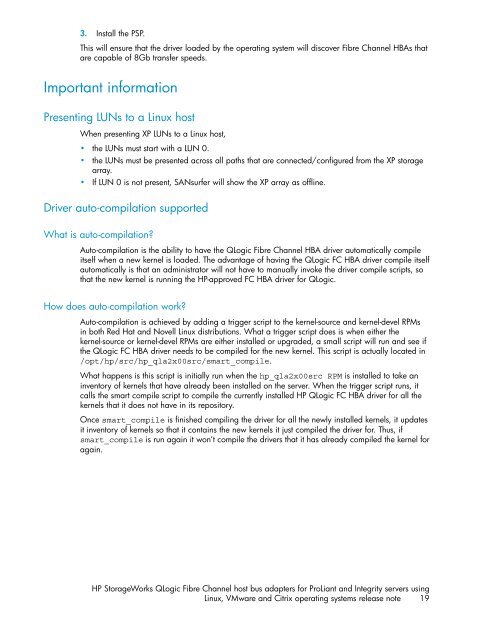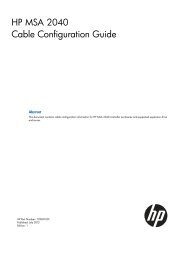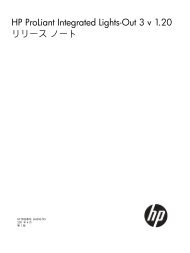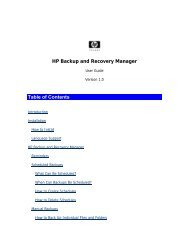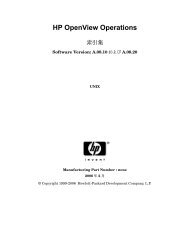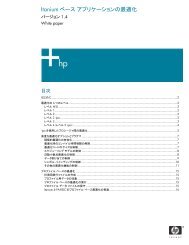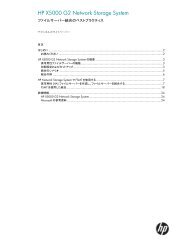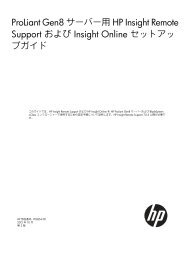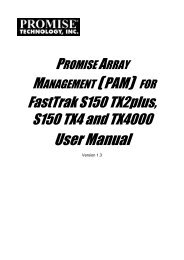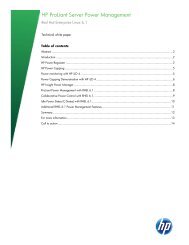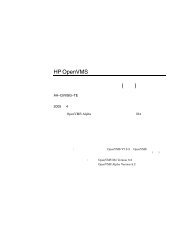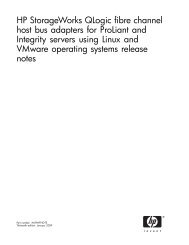HP StorageWorks QLogic Fibre Channel host bus adapters for HP ...
HP StorageWorks QLogic Fibre Channel host bus adapters for HP ...
HP StorageWorks QLogic Fibre Channel host bus adapters for HP ...
You also want an ePaper? Increase the reach of your titles
YUMPU automatically turns print PDFs into web optimized ePapers that Google loves.
3. Install the PSP.<br />
This will ensure that the driver loaded by the operating system will discover <strong>Fibre</strong> <strong>Channel</strong> HBAs that<br />
are capable of 8Gb transfer speeds.<br />
Important in<strong>for</strong>mation<br />
Presenting LUNs to a Linux <strong>host</strong><br />
When presenting XP LUNs to a Linux <strong>host</strong>,<br />
• the LUNs must start with a LUN 0.<br />
• the LUNs must be presented across all paths that are connected/configured from the XP storage<br />
array.<br />
• If LUN 0 is not present, SANsurfer will show the XP array as offline.<br />
Driver auto-compilation supported<br />
What is auto-compilation?<br />
Auto-compilation is the ability to have the <strong>QLogic</strong> <strong>Fibre</strong> <strong>Channel</strong> HBA driver automatically compile<br />
itself when a new kernel is loaded. The advantage of having the <strong>QLogic</strong> FC HBA driver compile itself<br />
automatically is that an administrator will not have to manually invoke the driver compile scripts, so<br />
that the new kernel is running the <strong>HP</strong>-approved FC HBA driver <strong>for</strong> <strong>QLogic</strong>.<br />
How does auto-compilation work?<br />
Auto-compilation is achieved by adding a trigger script to the kernel-source and kernel-devel RPMs<br />
in both Red Hat and Novell Linux distributions. What a trigger script does is when either the<br />
kernel-source or kernel-devel RPMs are either installed or upgraded, a small script will run and see if<br />
the <strong>QLogic</strong> FC HBA driver needs to be compiled <strong>for</strong> the new kernel. This script is actually located in<br />
/opt/hp/src/hp_qla2x00src/smart_compile.<br />
What happens is this script is initially run when the hp_qla2x00src RPM is installed to take an<br />
inventory of kernels that have already been installed on the server. When the trigger script runs, it<br />
calls the smart compile script to compile the currently installed <strong>HP</strong> <strong>QLogic</strong> FC HBA driver <strong>for</strong> all the<br />
kernels that it does not have in its repository.<br />
Once smart_compile is finished compiling the driver <strong>for</strong> all the newly installed kernels, it updates<br />
it inventory of kernels so that it contains the new kernels it just compiled the driver <strong>for</strong>. Thus, if<br />
smart_compile is run again it won’t compile the drivers that it has already compiled the kernel <strong>for</strong><br />
again.<br />
<strong>HP</strong> <strong>StorageWorks</strong> <strong>QLogic</strong> <strong>Fibre</strong> <strong>Channel</strong> <strong>host</strong> <strong>bus</strong> <strong>adapters</strong> <strong>for</strong> ProLiant and Integrity servers using<br />
Linux, VMware and Citrix operating systems release note 19


